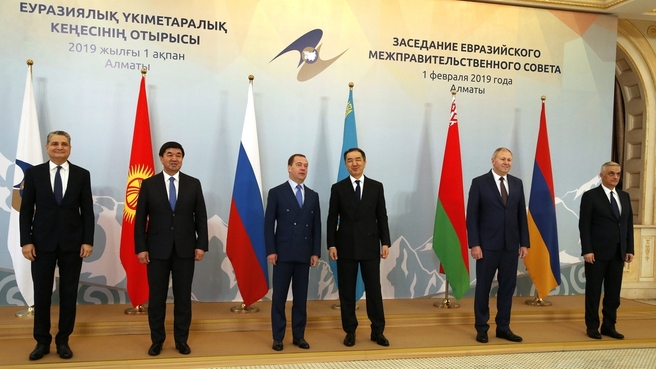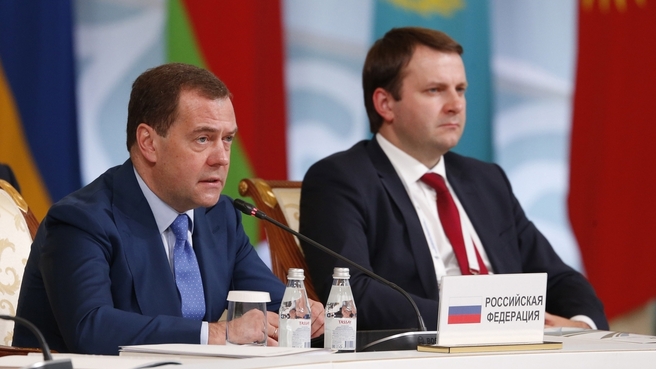Dmitry Medvedev: "In 10 months of 2018, trade between our union members increased by almost 12 percent, mainly due to an increase in commodity weight. It is important to continue to expand mutual trade so that the consumer market offers more EAEU-made goods and the customers – this is our key goal that we should strive to achieve – have a wide choice of goods based on their preferences, quality and, last but not least, price".
Dmitry Medvedev’s remarks at the Eurasian Intergovernmental Council meeting
Documents signed following the Eurasian Intergovernmental Council meeting
Delegation heads taking part in the meeting of the Eurasian Intergovernmental Council:
Prime Minister of the Republic of Belarus Sergei Roumas
Prime Minister of the Republic of Kazakhstan Bakytzhan Sagintayev
Prime Minister of the Kyrgyz Republic Mukhammedkalyi Abylgaziyev
Prime Minister of the Russian Federation Dmitry Medvedev
Deputy Prime Minister of the Republic of Armenia Mher Grigoryan
Chairman of the Board of the Eurasian Economic Commission Tigran Sargsyan
Dmitry Medvedev’s remarks at the Eurasian Intergovernmental Council meeting:
Colleagues, Mr Sagintayev, I would like to once again greet everyone and thank our comrades from Kazakhstan for this well-organised meeting and the comfortable and friendly atmosphere here in Almaty.
I will say a few words about 2018. Last year, Russia presided over our union. We managed to make progress in many areas of integration construction and to achieve fairly good economic results. Perhaps, we could have done an even better job and achieved more, but our overall results are not bad nonetheless. In 10 months of 2018, trade between our union members increased by almost 12 percent, mainly due to an increase in commodity weight, and trade with our external partners grew by 21 percent. However, comparing these figures doesn’t always tell the whole story because these percentages do not show actual changes in the volumes of moved goods and do not show the trade structure. Still, we must strive to do our best. Importantly, businesses are taking advantage of integration, and our common market is being filled with products. It is important to continue to expand mutual trade so that the consumer market offers more EAEU-made goods and the customers – this is our key goal that we should strive to achieve – have a wide choice of goods based on their preferences, quality and, last but not least, price. It is necessary to make wider use of national currencies in mutual settlements, although we have reached fairly decent levels in many positions.
We have a lot to accomplish in the coming year. The Declaration on Promoting Integration Processes which was adopted by the presidents in December 2018 sets goals with regard to strengthening the union to 2025 and filling this project with initiatives that meet the interests of our people.
Russia has come up with a number of proposals in areas such as improving the business environment, launching a money transfer system, improving distribution mechanisms for agricultural products, food, creating a digital platform for small- and medium-sized businesses, as well as Eurasian online resources in education and culture, sports, tourism and so on. Importantly, these projects deserve support as they are very important and consequential for our countries and citizens.
Let me highlight some of the objectives we share.
The first one deals with introducing digital technology in various areas, as we have already discussed at the forum today. It is essential that all five EAEU countries not only launch national programmes in this area, but also make sure that they are in step with each other. I elaborated on this earlier today. Let me reiterate that integration may advance faster in some areas compared to others, and one country can get ahead, while another opts for saving resources and progresses at a slower pace. However, this should not affect digitalisation since we will be unable to understand each other without a single digital agenda and a single set of rules. Resolutions and instruments adopted in one country would be incomprehensible for the other countries. I think there is consensus among us on this point.
Moving on, it is obvious that supranational regulations are in need of further adjustments and improvements in order to remove barriers within the EAEU market. Mr Sergei Roumas has just raised this point, and I totally agree that we need better supranational mechanisms and lower barriers.
An agreement to regulate the alcohol market has been drafted with a view to making regulations in this sector transparent. This is important, and the faster we do it, the closer it will bring us to entering a new phase in the integration process.
Product labelling is another effective mechanism for ensuring transparency on the common market. Among our achievements in this field is the pilot project to label fur products, and the current goal is to apply these practices to other product categories.
I would like to ask our colleagues to expedite ratification procedures for the Agreement on the Labelling of Goods by Means of Identification in the Eurasian Economic Union, which was signed last year.
An agreement on navigation is expected to be signed today. We have worked on this for several years, and at the end of the day have succeeded in taking into consideration the opinions of all parties.
The third objective consists of promoting international cooperation. Let me remind you that important agreements with Iran and China were signed in 2018, creating favourable conditions for Eurasian exports. The Russian Federation completed the ratification of these instruments last year. I would like to ask my colleagues to accelerate these procedures within their respective countries. It is essential that these agreements become operational in the first six months of 2019.
We also need to remain proactive in the ongoing talks with our partners on preferential trade agreements with Singapore, Serbia, Egypt and Israel, and launch these talks with India. By holding talks of this kind we can demonstrate the effectiveness of our union, our ability to make deals and the overall soundness of the EAEU. We remain committed to the priority goal of strengthening cooperation between the EAEU and the Commonwealth of Independent States, just as with our partners in a number of regions in the world.
Documents signed following the Eurasian Intergovernmental Council meeting:
• Instruction “On certain aspects of creating supranational enterprises based on the example of the European Company”
• Decision “On mechanisms for implementing projects under the digital agenda of the Eurasian Economic Union”
• Instruction “On the work on the draft Agreement on the Regulation of the Alcohol Market in the Eurasian Economic Union”
• Instruction “On the standards for distributing import customs duties among the budgets of the Eurasian Economic Union member states”
• Instruction “On the progress in implementing the Instruction of the Eurasian Intergovernmental Council No. 10 of 27 July 2018”
• Directive “On mutual trade between the member states of the Eurasian Economic Union in 2018”
• Directive “On the Macroeconomic Situation in the Eurasian Economic Union member states and Proposals for Sustainable Economic Development”
• Directive “On holding regular meetings between the Eurasian Economic Union member states and proposals for sustainable development”
• Agreement “On signing the Agreement on Navigation"
• Directive “On the time and venue for holding the next meeting of the Eurasian Intergovernmental Council”











